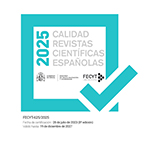Autonomia moral, soberania popular e uso público da razão em Kant
Resumen
Em Direito e Democracia, Habermas apresenta uma ambiguidade no conceito kantiano de autonomia que levaria a uma relação de concorrência entre direitos humanos e soberania popular: este conceito teria sido introduzido do ponto de vista privado do sujeito individual que julga moralmente e explicitado do ponto de vista da formação política discursiva e democrática da vontade. Contrapondo-se a essa leitura, Maus argumenta que Kant desenvolve os direitos humanos e a soberania popular na mais estreita complementaridade recíproca. Contudo, ela aceita a crítica de Habermas ao caráter monológico do princípio kantiano da moral, mantendo a ambiguidade do conceito de autonomia. No presente artigo pretendo sugerir que quando se atenta para as concepções de Esclarecimento e “uso público da razão” apresentadas por Kant nos textos políticos torna-se possível compreender que longe de desvalorizar a formação política da vontade, Kant a estabelece como um passo fundamental para a realização da moralidade e, portanto, da autonomia da vontade. Num primeiro momento, argumentarei que que ao explicar o princípio de autonomia mediante a ideia de autolegislação da vontade, Kant não introduz uma ambiguidade neste conceito. Pelo contrário, ele estabelece uma estrutura normativa comum entre os domínios da moral e do direito. Por fim, retornarei à Doutrina do Direito para argumentar que, para Kant, a interação e comunicação entre os cidadãos não é lateral para a legitimação do direito, visto que são exigidos o consentimento dos membros da comunidade política e o convencimento pela razão.Descargas
Descarga artículo
Licencia
La revista Las Torres de Lucca. International Journal of Political Philosophy, para fomentar el intercambio global del conocimiento, facilita el acceso sin restricciones a sus contenidos desde el momento de su publicación en la presente edición electrónica, y por eso es una revista de acceso abierto. Los originales publicados en esta revista son propiedad de la Universidad Complutense de Madrid y es obligatorio citar su procedencia en cualquier reproducción total o parcial. Todos los contenidos se distribuyen bajo una licencia de uso y distribución Creative Commons Reconocimiento 4.0 (CC BY 4.0). Esta circunstancia ha de hacerse constar expresamente de esta forma cuando sea necesario. Puede consultar la versión informativa y el texto legal de la licencia.












